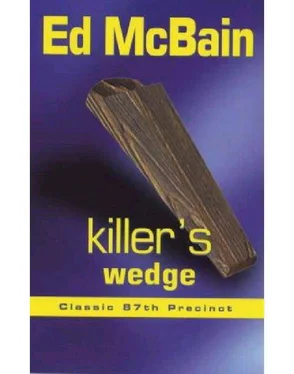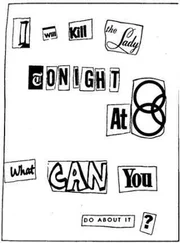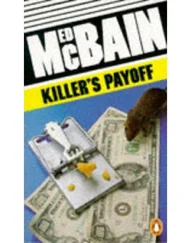McBain, Ed - Killer's Wedge
Здесь есть возможность читать онлайн «McBain, Ed - Killer's Wedge» весь текст электронной книги совершенно бесплатно (целиком полную версию без сокращений). В некоторых случаях можно слушать аудио, скачать через торрент в формате fb2 и присутствует краткое содержание. Жанр: Полицейский детектив, на английском языке. Описание произведения, (предисловие) а так же отзывы посетителей доступны на портале библиотеки ЛибКат.
- Название:Killer's Wedge
- Автор:
- Жанр:
- Год:неизвестен
- ISBN:нет данных
- Рейтинг книги:3 / 5. Голосов: 1
-
Избранное:Добавить в избранное
- Отзывы:
-
Ваша оценка:
- 60
- 1
- 2
- 3
- 4
- 5
Killer's Wedge: краткое содержание, описание и аннотация
Предлагаем к чтению аннотацию, описание, краткое содержание или предисловие (зависит от того, что написал сам автор книги «Killer's Wedge»). Если вы не нашли необходимую информацию о книге — напишите в комментариях, мы постараемся отыскать её.
Killer's Wedge — читать онлайн бесплатно полную книгу (весь текст) целиком
Ниже представлен текст книги, разбитый по страницам. Система сохранения места последней прочитанной страницы, позволяет с удобством читать онлайн бесплатно книгу «Killer's Wedge», без необходимости каждый раз заново искать на чём Вы остановились. Поставьте закладку, и сможете в любой момент перейти на страницу, на которой закончили чтение.
Интервал:
Закладка:
Juan Alverra read and wrote only Spanish.
CHAPTER 10
Cotton Hawes unobtrusively closed first one window and then the other. Outside, the sultry night pressed its blackness against the windowpanes, filtered by the triangular mesh beyond the glass. The six hanging light globes, operated by a single switch inside the railing near the coat rack, feebly defended the room against the onslaught of darkness. A determined silence had settled over the squad room the silence of waiting.
Angelica Gomez sat with her crossed legs and high-heeled pumps, jiggling one foot impatiently. Her coat was draped over the back of her chair. Her peasant blouse swooped low over her confessedly unrestricted bosom. She sat with her own thoughts-thoughts perhaps of the man whose throat she'd cut, a man named Kassim whose friends had behind them the power of the vendetta; thoughts perhaps of the uncompromising arm of the law;
thoughts perhaps of an uncomplicated island in the Caribbean where the sun had always shone and where she had helped cut sugar cane in season and drunk deeply of rum at night with the guitars going in the velvet black hills.
At the desk beside her sat Virginia Dodge, solemnly dressed in black-black dress and black overcoat and black shoes and black leather tote bag. Thin white legs and a thin white face. The blue-black steel of a revolver in her fist. The colorless oil of a high explosive on the desk before her.
Nervously, the fingers of her left hand rapped a tattoo on the desk top. Her eyes, so brown that they toe appeared black, darted about the room, wild birds searching for a roost, settling always on the corridor beyond the railing, waiting for the apearance of a detective who had sent her man to prison.
Behind her, on the floor near the huge green bulk of the metal filing cabinets, lay at Miscolo, police clerk. Unconscious, gasping for breath, his Chest and head on fire, Miscolo did not know he might be dying. Miscolo knew nothing. In the void of his unconsciousness, he dreamt he was a boy again. He dreamt that it was Hallowe'en, dreamt that he was carrying bundles of paper to be tossed into the huge bonfire set in the middle of the city street. He dreamt he was happy.
Cotton Hawes wondered if the room were getting any hotter.
It was difficult to tell. He was sweating profusely, but he was a big man, and he always did sweat when the pressure mounted. He had not sweated much when he was a detective assigned to the 30th Squad. The 30th was a posh precinct and he had not, in all truth, relished his transfer to the 87th. The transfer had come through in June, and now it was October-four paltry months-and here he was a part of the 87th, working with the men here, knowing the men here, deeply concerned about the welfare of a single solitary man named Steve Carella.
Perhaps the lieutenant was right.
Misunderstanding Byrnes' thinking, Hawes assumed he was willing to let Carella die for the safety of the other men on the squad, and perhaps Byrnes' reasoning was right.
Perhaps it was perfectly moral and perfectly logical to allow Carella to walk into the blazing end of a .38. But Hawes did not believe so.
The 87th, he'd discovered, was a strange precinct and a strange squad. He had approached the transfer with great hostility, rejecting the concept of slums and slum dwellers, rejecting the men of the squad, chalking them off as disillusioned cynics even before he'd met them. He had learned otherwise, and very quickly.
He had learned that the people of the slums were only people. They enjoyed the same pleasures he did, and they suffered a great many misfortunes he would never have to suffer. They wanted love, and they wanted respect,
and the walls of a tenement (lid not necessarily become the cage of an animal. He had learned this from the men of the squad. He had seen each and every one of them in action. He knew that they held no rose-colored-glasses view of the precinct or its crime rate. He knew they could knock a thief flat on his back without batting an eyelid and without any great amount of soul-searching afterwards. Crime was crime, and no cop of the 87th tried to rationalize the evil of crime.
But he was surprised to learn that the men of the 87th clung to another concept which in no way limited the effectiveness of their law enforcement; that concept was fairness. And within this concept, they knew when to get tough and when to understand, They did not automatically equate slum dwellers with criminals. A thief was a thief-but a person was a person. Fairness. And he had found the concept a contradictory one for men confronted daily with the facts of violence and sudden death.
And now, in the squad room where fairness was an unspoken credo, the men had been presented with a situation1 which was totally unfair, totally illogical, and yet it sat there. Immovable, illogical, unfair, it sat there and waited.
Perhaps there was a primitive justice to the reasoning of Virginia Dodge. An eye for an eye, a tooth for a tooth, had not the Bible so specified? Hawes' father had been a religious man, a man who'd felt that Cotton Mather was the greatest of the Puritan priests, a man who'd named his son in honor of the colonial God-seeker who'd hunted witches with the worst of them.
Jeremiah Hawes had chalked off the Salem witch trials as the personal petty revenges of a town feeding on its own ingrown fears. He had exonerated Cotton Mathe:
and the role the priest had played in bringing the delusioi to its fever pitch.
And now, Virginia Dodge was engaged in her own witch hunt. Revenge. Steve Carella had done her an irreparable ill by sending her husband to prison, where he' died. Perhaps the good Reverend Parris in 1692 had felt too, that the townspeople of Salem had done him the same ill when they'd haggled over the amount of firewood he'd need to get through the winter. Perhaps the Reverend Parris had all unconsciously fed the fires of the hunt in an attempt to strike back at the petty people of the town. There was no such element of unconscious behavior in the actions of Virginia Dodge. She had come here to do murder, she had come here to satisfy a consuming desire for revenge.
There had been sane people in 1692.
There were sane people in this squad room today. And yet the sane ones had allowed the "witches" to be hanged. And would the sane ones here, today, in the face of the judgment of Virginia Dodge, fanatic, allow Steve Carella to be hanged?
I wonder if it's getting any hotter? Hawes thought.
He looked across the room and saw that Willis had unloosened his tie. He hoped desperately that-if the room were truly getting hotter-none of the men would mention the heat, none of them would go to the thermostat and lower it to a normal setting.
Leaning against the bulletin boards near the coat rack, Lieutenant J3yrnes watched Hawes with narrowed eyes.
Of all the people in the room, Byrnes had been the only one to see Hawes raise the thermostat. Talking with Grossman on the telephone, he had watched Hawes as he stepped swiftly to the wall and twisted the dial on the instrument. Later, he had seen Hawes when he closed both windows, and he knew then that Hawes had something on his mind, that both actions were linked and not the idle movements of a thoughtless man.
He wondered now what the plan was.
He also wondered who or what would screw it up.
He had seen the action, but he was reasonably certain no one else in the room had followed it. And if Hawes was banking on heat, who would soon comment on the heat? Anyone might. Bert Kung had already taken off his jacket and was now mopping his brow. Willis had pulled down his tie. Angelica Gomez had pulled her skirt up over her knees like a girl sitting on a park bench trying to get a breeze from the river. Who would be the first to say, "It's hot as hell in here?"
Читать дальшеИнтервал:
Закладка:
Похожие книги на «Killer's Wedge»
Представляем Вашему вниманию похожие книги на «Killer's Wedge» списком для выбора. Мы отобрали схожую по названию и смыслу литературу в надежде предоставить читателям больше вариантов отыскать новые, интересные, ещё непрочитанные произведения.
Обсуждение, отзывы о книге «Killer's Wedge» и просто собственные мнения читателей. Оставьте ваши комментарии, напишите, что Вы думаете о произведении, его смысле или главных героях. Укажите что конкретно понравилось, а что нет, и почему Вы так считаете.












